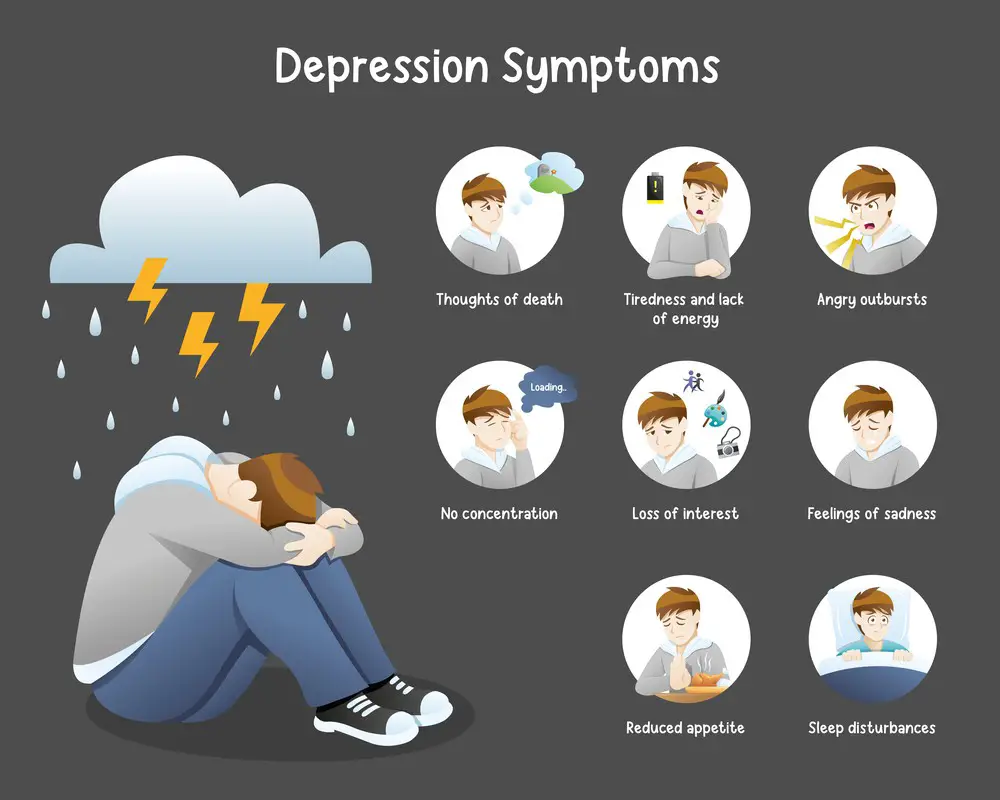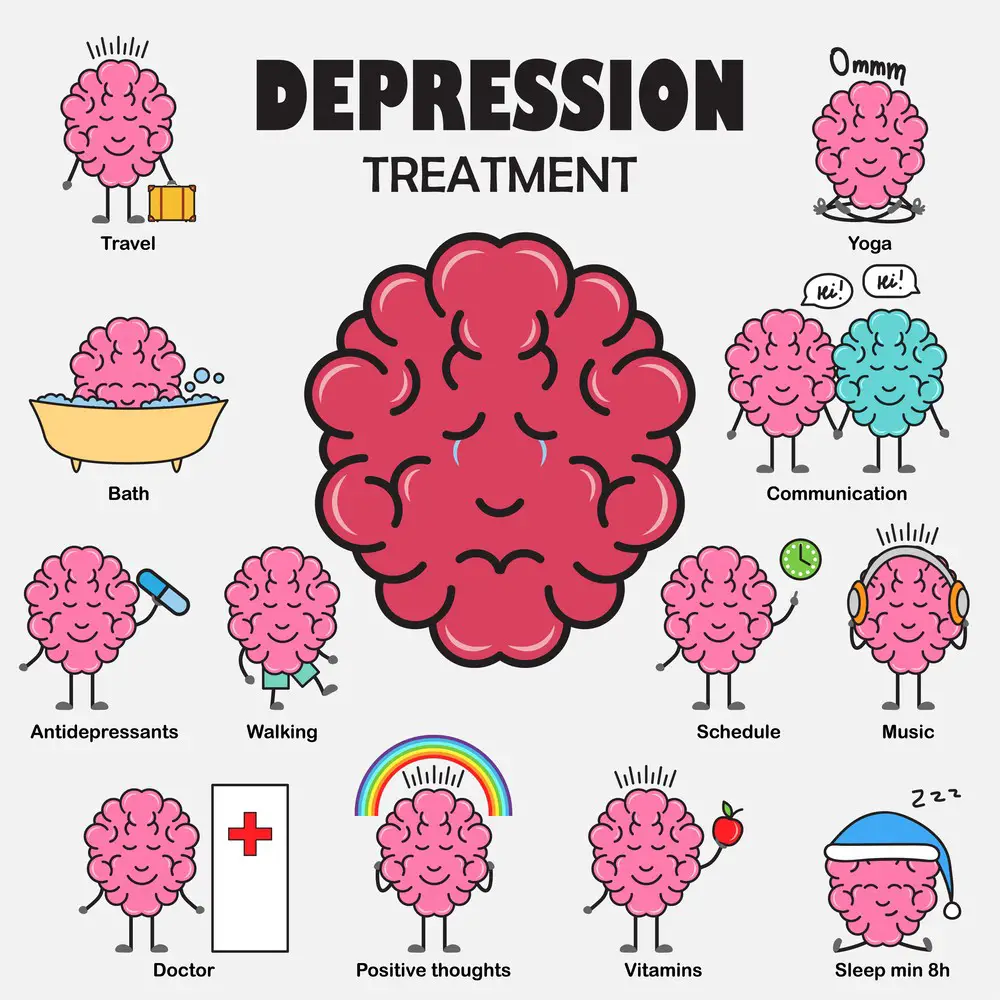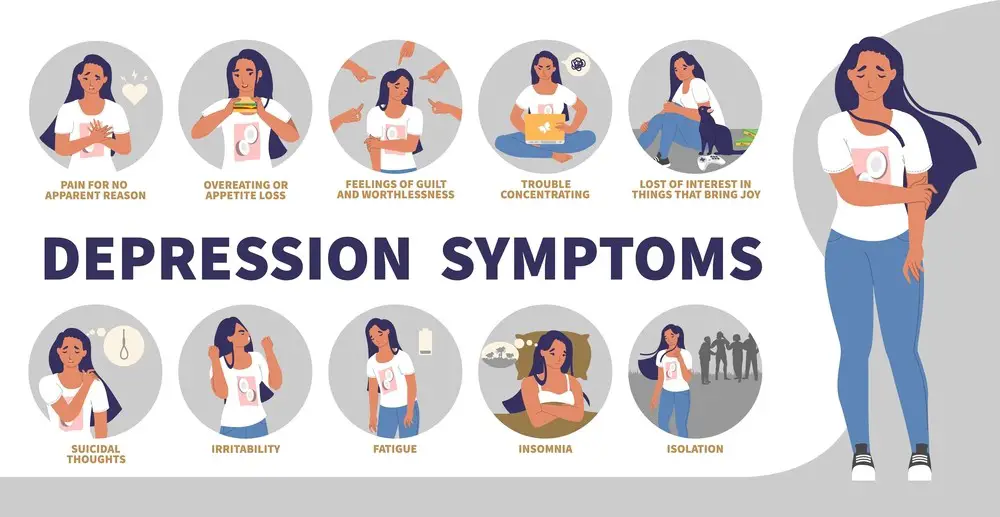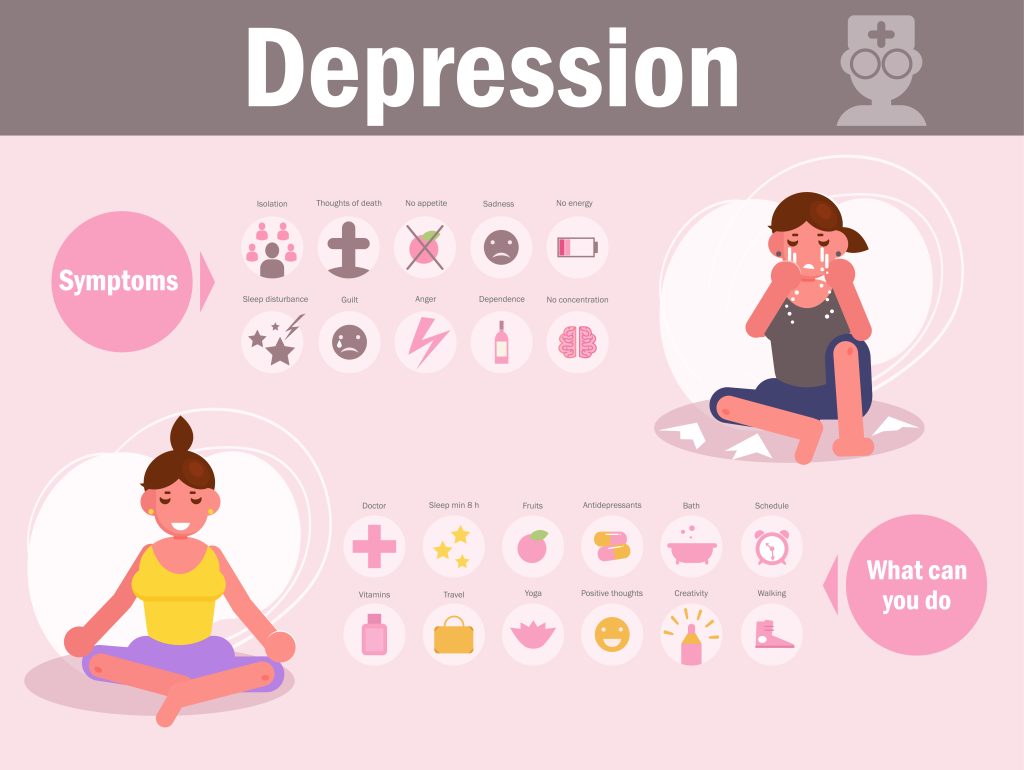As a BetterHelp affiliate, we receive compensation from BetterHelp if you purchase products or services through the links provided
Dealing with depression can be an uphill battle, leaving you feeling drained and hopeless. In such times, a tool that many people find helpful is using positive affirmations. These powerful statements can help shift your mindset and provide the necessary strength and motivation to overcome the dark cloud of depression.
Affirmations for depression are simply a set of uplifting and motivational phrases that you repeat to yourself as a way to challenge and reframe negative thoughts. By implementing affirmations into your daily routine, it becomes possible to counteract the common symptoms of depression, such as fatigue, low self-esteem, and a constant state of pessimism. With practice, these affirmations often lead to lasting positive changes in your thought patterns and overall mental well-being.
Key Takeaways
- Affirmations can help combat negative thoughts and feelings associated with depression
- Incorporating positive statements into your daily routine can lead to lasting mental health improvements
- Combining affirmations with professional interventions can boost their effectiveness in treating depression
 Understanding Depression
Understanding Depression
Depression is a common mental health condition that affects millions of people around the world. When you’re experiencing depression, you may feel persistent sadness and hopelessness and find it difficult to enjoy activities that you once loved. It’s crucial to understand that depression is more than just feeling down now and then; it can impact your daily life and make it challenging to work, maintain relationships, and take care of yourself.
In many cases, depression goes hand in hand with anxiety, another mental health condition that can cause symptoms such as excessive worry, restlessness, and irritability. It’s important to recognize when you’re experiencing either or both of these conditions and seek help from a mental health professional.
Some key symptoms of depression may include:
- Persistent sadness: A constant feeling of sadness that can last for several weeks or months
- Hopelessness: A sense of despair, feeling like there’s no light at the end of the tunnel
- Loss of interest: Difficulty finding pleasure in hobbies, activities, or social events once enjoyed
- Overwhelming fatigue: Exhaustion and lack of energy, making daily tasks complex to complete
- Difficulty sleeping: Insomnia or sleeping too much, affecting overall wellbeing
If these symptoms describe what you’re going through, you must acknowledge your feelings and take the necessary steps toward healing.
Remember, it’s okay to ask for help. Reach out to friends, family, or a mental health professional to discuss your experiences with depression. They can guide and support your journey toward a healthier state of mind. By understanding your depression and symptoms, you’re taking the first step in overcoming this challenging mental health condition.
 The Science of Affirmations
The Science of Affirmations
Affirmations are powerful statements that help you overcome negative thoughts and foster positivity. They have a solid foundation in psychology and neuroscience, and many research studies have shown their effectiveness in combating depression.
One key concept behind affirmations is the idea of neuroplasticity. Your brain has the incredible ability to rewire and adapt to new circumstances, even as an adult. Repeating positive affirmations can consistently create new neural pathways that promote positive thinking and improved mental health.
Cognitive theory also plays a role in the effectiveness of affirmations. According to this theory, your beliefs and thoughts can shape your emotions and behavior. By consciously changing your thoughts through affirmations, you pave the way for a change in your feelings and actions.
Self-affirmation theory further explains how affirmations work. Researchers posit that practicing self-affirmation allows you to maintain a positive self-image when faced with adversity. This helps you build resilience and can contribute to greater well-being.
Here are some key takeaways for using affirmations to improve your mental health:
- Learn about neuroplasticity, and remember that your brain can adapt and change.
- Understand the role of cognitive theory in shaping your emotions and behavior.
- Practice self-affirmation regularly to build resilience and improve your overall well-being.
Stay consistent and patient with your affirmations; over time, you’ll likely notice a positive shift in your mindset and mood. With the science to back it up, incorporating affirmations into your daily routine could be the game-changer you’ve been searching for in your battle against depression.
 How Affirmations Combat Depression
How Affirmations Combat Depression
Dealing with depression can be incredibly challenging, but positive affirmations can help you combat the negative thoughts and beliefs that can fuel your depressive symptoms. You might wonder how affirmations work to counter negative perceptions. Here’s a breakdown of how these positive statements can help in coping with depression.
Replacing Negative Thoughts with Positive Ones
Affirmations help you replace negative thoughts with positive ones, gradually shifting your mindset. As you consistently recite and believe in these uplifting statements, your brain rewires itself, replacing the negative thinking patterns that contribute to depression with more optimistic and empowering thoughts.
Breaking the Cycle of Negative Belief Systems
Depressive symptoms often stem from deeply ingrained negative beliefs about yourself, your abilities, and your worth. By practicing affirmations, you actively challenge and reshape these beliefs, turning them into positive and supportive ones. This can help you escape the cycle of self-defeating thoughts that keep you trapped in depression.
Strengthening Coping Skills
When coping with depression, having a strong set of tools to help you navigate tough emotions and experiences is crucial. Affirmations can be a valuable addition to your coping toolkit, providing you with a quick and effective way to shift your focus and mood when you’re feeling overwhelmed or struggling with depressive symptoms.
Boosting Self-Esteem and Confidence
Positive affirmations can remind you of your inherent worth, capabilities, and potential. As you repeat these uplifting statements, you’ll start to internalize them and genuinely believe their message. In turn, this can boost your self-esteem and confidence, which can have a profound impact on reducing your depressive symptoms and improving overall mental health.
Key Takeaway:
Affirmations can be a powerful tool in combating depression by replacing negative thoughts with positive ones, challenging negative beliefs, strengthening your coping skills, and boosting your self-esteem and confidence. Make a habit of using affirmations regularly to help you navigate and ultimately overcome the challenges of depression.

Types of Affirmations
Various types of affirmations can help you combat depression. Affirmations should be designed to support your mental well-being and promote a positive mindset. Let’s explore the key types of affirmations so you can choose the ones that resonate with you the most.
Positive Affirmations: These affirmations focus on uplifting statements encouraging a happier mental state. They are typically short and simple, making it easy for you to remember and repeat them throughout the day. Examples of positive affirmations include:
- I am worthy of love and happiness.
- I choose to focus on the good in my life.
- My strength is greater than any challenge I face.
Self-Affirmation: This type of affirmation specifically targets your self-esteem and self-worth. It serves as a reminder of your worthiness and encourages self-acceptance. Some examples of self-affirmations are:
- I deserve to be happy and successful.
- I am proud of who I am and my achievements.
- I accept myself unconditionally.
Future-Oriented Affirmations: These affirmations focus on your future goals, dreams, and aspirations in a positive light. By envisioning a brighter future, you’re more likely to work towards it with persistence and determination. Examples of future-oriented affirmations might include:
- I am working towards a better future full of love and success.
- I have the power to shape my future with my actions.
- My dreams are within my reach and I will achieve them.
Personally Relevant Affirmations: This category is all about creating affirmations that speak to your unique experience and situation. They should be tailored to address areas in your life that need improvement, resilience, or encouragement. Some tips for creating personally relevant affirmations:
- Reflect on your personal goals and challenges.
- Identify areas in your life you’d like to change or improve.
- Craft affirmations that specifically address those areas.
A well-rounded approach to using affirmations for depression includes incorporating various types of affirmations into your daily routine. As you do so, you’ll likely notice an improvement in your mood, self-esteem, and overall well-being. So, don’t be afraid to mix and match types of affirmations to create a personalized coping strategy that works for you.
 Incorporating Affirmations in Daily Routine
Incorporating Affirmations in Daily Routine
Incorporating daily affirmations into your routine can be a powerful way to shift your mindset and create a roadmap for positive thoughts and behavior. Here are a few strategies to make affirmations a part of your daily life:
Morning Mirror Talk: Start your day with a boost by repeating affirmations in front of the mirror each morning. As you get ready for the day, look yourself in the eye and speak your affirmations out loud. This helps to reinforce your self-belief and sets the tone for a joyous day ahead.
Pre-sleep Repetition: Before you drift off to sleep, take some time to recite your daily affirmations. This helps to calm your mind and allows the positive thoughts to sink into your subconscious as you rest. You’ll wake up more energized and ready to tackle the day with newfound optimism.
Visual Reminders: Place sticky notes with your affirmations written on them around your living space, office, or even on your car’s dashboard. These little reminders will help you focus on the positive messages throughout the day, even when you’re not actively practicing them.
Affirmation Breaks: During the day, take short breaks to practice affirmations. Just a few minutes of focused, positive thinking can significantly impact your mood and overall outlook. You can do this at your desk, during your lunch break, or whenever you find a quiet moment.
Here’s a key takeaway: Integrate daily affirmations into your routine using strategies like morning mirror talk, pre-sleep repetition, visual reminders, and affirmation breaks. This will help create a roadmap for positive thoughts and behavior, making it easier to maintain a healthy mindset and combat depression.
 The Benefits of Affirmations in Treating Depression
The Benefits of Affirmations in Treating Depression
Using affirmations as a tool in treating depression can have a myriad of benefits for your well-being, and here’s how:
- Reduce stress: Regularly practicing affirmations can help calm your mind and allow you to cope better with stressors, easing the pressure on your mental health.
- Increase healthy behavior: By channeling positive beliefs and intentions, affirmations can inspire and motivate you to engage in healthier behaviors, contributing to a more balanced lifestyle.
- Improve mental health: Affirmations can bring about positive thinking patterns, helping diminish depressive thoughts and fostering a more optimistic outlook.
- Bolster confidence: Reinforcing positive self-beliefs through affirmations can profoundly affect your confidence, empowering you to face difficult situations with a stronger sense of self.
When used consistently, affirmations activate the reward centers in the brain, which can enhance the positive effects mentioned above. This rewarding system can also help improve your problem-solving skills under stress, making it easier to navigate challenging situations.
Finally, one of the most significant benefits of affirmations is their boost to self-esteem. By focusing on your strengths and achievements, affirmations remind you of your worth and foster a more positive self-image.
Key takeaway: Incorporating affirmations into your daily routine can help reduce stress, increase healthy behavior, improve mental health, bolster confidence, stimulate reward centers, enhance problem-solving under stress, and boost self-esteem, significantly improving your overall well-being in the fight against depression.
 Professional Interventions and Affirmations
Professional Interventions and Affirmations
When it comes to treating depression, professional interventions play a crucial role. They help to address the underlying issues and provide support for individuals to overcome their depression. Within these interventions, affirmations could be a helpful tool to foster a positive mindset.
One effective professional intervention is psychotherapy. This therapeutic approach encompasses various techniques aimed at helping you change negative thought patterns, improve your mood, and develop healthy coping skills. Cognitive-behavioral therapy (CBT) is a popular type of psychotherapy that often incorporates affirmations as a way to replace negative thoughts with positive ones. By consistently repeating affirmations, you can gradually rewire your brain to focus on the positive aspects of life rather than dwelling on the negative.
Another important aspect of depression treatment is medication. Prescribed by a healthcare provider, antidepressants can help manage the chemical imbalances in your brain that contribute to depression. Following the prescribed treatment protocol and combining medication with affirmations is essential. For example, remind yourself that “I am taking these medications to support my healing journey” or “These medications are helping me feel better, and I am grateful for that.”
Professional interventions don’t stop at therapy and medication. Your healthcare provider may also suggest lifestyle changes to support your recovery from depression. These could include regular exercise, a balanced diet, and adequate sleep. To help you stay motivated, use affirmations like “I am taking care of my body and mind,” “I am committed to my well-being,” and “Every step I take brings me closer to healing.”
Social psychological interventions are another part of comprehensive depression treatment. These interventions typically involve connecting with others who understand your situation, such as joining a support group or participating in group therapy. Positive affirmations can help you in these environments by fostering a sense of connection and understanding with others. Examples of affirmations include “I am not alone in my journey,” “I am surrounded by people who care,” and “Together, we can overcome depression.”
In summary, combining professional interventions, such as psychotherapy, medication, lifestyle changes, and social psychological interventions, with affirmations can help create a holistic approach to depression treatment. Remember to consistently practice affirmations, adapting them to your needs as you progress on your healing journey.
Creating Your Personal Affirmations
Crafting personal affirmations can be a powerful tool to help combat depression. When creating your affirmations, incorporate love, worth, value, confidence, support, strength, and optimism. Here’s how to get started:
- Identify your goals and needs: Take time to reflect on the areas in your life where you may need more positivity, motivation, or hope. Your affirmations should reflect your unique desires and aspirations for personal growth.
- Choose positive, empowering phrases: Create statements that inspire a positive mindset while addressing the aspects you identified in the previous step. Use words like love, strength, happiness, and confidence to reinforce a sense of self-worth and hope for the future.
Here’s an example of a personal affirmation:
I radiate love, confidence, and strength. I am in control of my happiness, and my mind is filled with hope and positivity.
- Keep it personal and relatable: Affirmations should resonate with you on a personal level. Make sure they reflect your own values, beliefs, and experiences. This can help increase the effectiveness of your affirmations and make them more relatable.
- Practice repetition and consistency: Use your affirmations daily to cultivate positive thoughts and habits. Incorporate them into your routine, such as during morning meditation, before bedtime, or whenever you need an extra boost of motivation.
Remember, creating personal affirmations is a journey; you might need to adjust them as you evolve and grow. Stay open to modifying your affirmations to suit your ever-changing needs better and maintaining a positive mindset.
Overcoming Challenges in Using Affirmations
Trying new strategies to combat depression can be demanding, especially when it comes to incorporating positive affirmations into your daily routine. It’s important to recognize that resilience and tenacity are huge in sticking to this practice. Here are some tips to help you overcome challenges while using affirmations:
- Accept the effort required: Recognize that incorporating affirmations into your life takes time and effort. Be patient, and remind yourself that self-improvement is a journey rather than an overnight change.
- Keep content relevant: Tailor your affirmations to your specific needs, goals, and areas where you want to boost your self-confidence. This personalization will make them more powerful and impactful.
- Avoid stigma: Sometimes, there might be a lingering stigma surrounding the practice of positive affirmations. You must remember that seeking help and encouragement through affirmations is a sign of strength, not weakness.
- Be realistic: While using positive affirmations, ensure they align with reality and your true self-worth. Over-the-top praise can feel insincere and may not contribute to lasting improvement.
- Use your voice: Say your affirmations out loud and with conviction. Speaking to them with confidence can help reinforce their power and effectiveness.
- Take what speaks to you: It’s okay to ignore the opinions of others when choosing affirmations. Focus on the ones that resonate with you and align with your values and desires.
- Reward progress: Acknowledge your milestones in practicing affirmations and reward yourself for your persistence. Positive reinforcement goes a long way in cementing the habit.
Key takeaway: Overcoming the challenges in using affirmations for depression involves embracing the effort, personalizing content, and celebrating successes. By implementing these strategies, you’ll be well on your way to building resilience and self-confidence through the power of positive affirmation.
 Success Stories: Affirmations for Coping with Depression
Success Stories: Affirmations for Coping with Depression
You might be wondering how affirmations can help someone cope with depression. Plenty of amazing success stories show the power of positive affirmations in promoting healing and well-being. Here are a few noteworthy examples:
Jessica is a businesswoman who struggled with depression for many years. When she started saying affirmations like “I am strong and capable” and “I am healing and getting better each day,” she noticed a shift in her mindset. Over time, these empowering statements became a valuable tool in her journey to recovery.
Mike, a young student, experienced depression due to academic stress. He adopted daily affirmations, such as “I am intelligent, and I am capable of learning,” and “I can handle any challenge that comes my way.” With this practice, Mike started to feel more confident and motivated, leading to improved academic performance and mental health.
For Sarah, a retired nurse battling depression, the affirmations “I deserve to be happy” and “I am worthy of love and care” played a significant role in her healing process. These affirmations allowed Sarah to slowly rebuild her self-esteem, confronting and overcoming her negative thoughts and emotions.
Here are some more general affirmation examples that can promote emotional healing:
- “I am allowing myself time to heal.”
- “I create a safe space for my emotions.”
- “My emotions do not define me or control me.”
- “Every breath I take fills me with hope and positivity.”
Remember, the key to experiencing the benefits of affirmations is consistency. Incorporate these statements into your daily routine – say them aloud, write them down, or post them in visible places.
To summarize, incorporating affirmations into your life can lead to significant improvements in your mental health and help you cope with depression. By repeating affirmations and truly believing in their positive messages, you can promote emotional healing and cultivate a more optimistic outlook on life.
 Frequently Asked Questions
Frequently Asked Questions
Do affirmations help lift mood?
Yes, affirmations can help lift your mood. These short, positive statements may help to counteract negative thoughts and reinforce positivity. Repeating them creates positive neural pathways that can improve your emotional state. Just remember, consistency is key!
Key takeaway: Positive affirmations can lift your mood when practiced consistently.
Which self-affirmations promote mental wellness?
Self-affirmations promoting mental wellness include:
- I am worthy of love and happiness.
- I am in control of my thoughts and emotions.
- I am strong and resilient.
- I choose to focus on the positive.
- I am at peace with myself and my surroundings.
Choose affirmations that resonate with you, and tweak them as needed.
Key takeaway: Find affirmations that resonate with you and promote mental wellness.
How can I create effective affirmations?
To create effective affirmations:
- Use positive, present tense language.
- Make them specific, yet flexible.
- Include an emotive or action-oriented component.
- Picture yourself successfully implementing your affirmation.
- Repeat them regularly, ideally several times a day.
Key takeaway: Creating effective affirmations involves positive language, specificity, and consistency.
What are some daily mantras for mental health?
Here are a few daily mantras for mental health:
- Today, I choose joy.
- I am grateful for the simple pleasures in life.
- This too shall pass.
- I am worthy of self-care and attention.
- One step at a time.
Feel free to adapt or create your mantras based on your emotional needs.
Key takeaway: Daily mantras can serve as reminders for prioritizing mental health and well-being.
How do I use affirmations for emotional support?
To use affirmations for emotional support:
- Identify the areas in which you need support.
- Choose or create affirmations tailored to those concerns.
- Set reminders or create affirmation cards to carry with you.
- Practice them throughout the day, especially during challenging moments.
- Share them with a friend or support group for motivation and accountability.
Key takeaway: Using affirmations for emotional support requires intentionality and consistency.
Can practicing affirmations impact my overall well-being?
Absolutely! When practiced regularly, affirmations can help improve your overall well-being by reducing negative thinking, increasing feelings of self-worth, and promoting a positive outlook. This can lead to reduced stress, improved self-esteem, and healthier relationships.
Key takeaway: Practicing affirmations can positively impact your overall well-being.
- 7 Ideas to Help You Relax and Unwind on a Family Vacation - April 27, 2025
- How Having Cybersecurity Protection Helps You Relax - April 25, 2025
- 8 Reasons Why Spending Time Outside Calms You Down - April 25, 2025
This site contains affiliate links to products. We will receive a commission for purchases made through these links.


 Understanding Depression
Understanding Depression The Science of Affirmations
The Science of Affirmations How Affirmations Combat Depression
How Affirmations Combat Depression Incorporating Affirmations in Daily Routine
Incorporating Affirmations in Daily Routine The Benefits of Affirmations in Treating Depression
The Benefits of Affirmations in Treating Depression Professional Interventions and Affirmations
Professional Interventions and Affirmations Success Stories: Affirmations for Coping with Depression
Success Stories: Affirmations for Coping with Depression Frequently Asked Questions
Frequently Asked Questions
